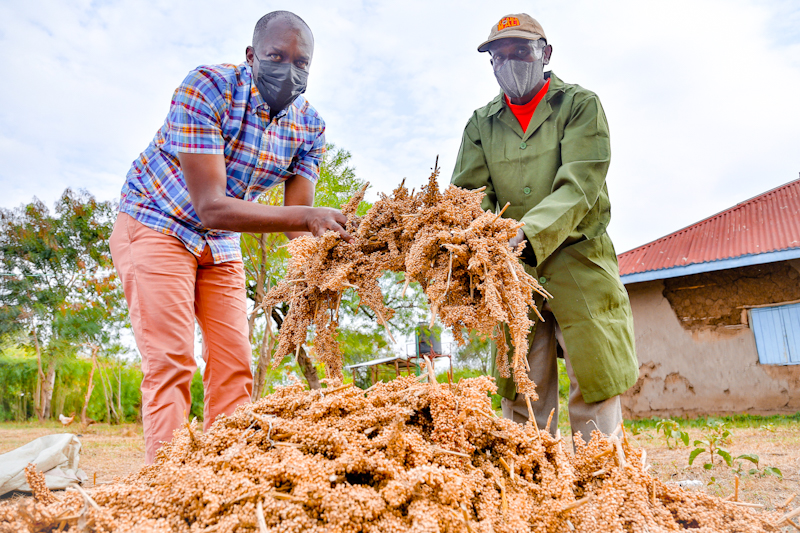Social entrepreneurship entails developing and funding solutions that directly address social issues such as food scarcity, poverty, unemployment, unequal opportunity, arid and semi-arid lands, and the effects of climate change.
Social entrepreneurship is a profit-making endeavour whose emphasis is placed on creating social and/or environmental changes. This brews a perfect balance between positively impacting the community and earning profits, providing longevity and impact.
Increasingly, the idea of carrying out ad hoc activities in the name of social responsibility has been replaced with established sustainability models that have become a must-do for businesses. Research shows that all business stakeholders – government, consumers, employees and investors – are more and more demanding that organizations take responsibility of their environmental, social and governance (ESG) arms.
(L)Gerald Gacheru, Head of Agribusiness EAML; Jennifer Githinji, Digi farm implementing partner and Jacob Githigi, Regional Agri business manager EAML. #MtamaNiMali pic.twitter.com/qPBf3JxeLI
— Kenya Breweries Ltd (@KenyaBreweries) February 23, 2021
An example of successful social entrepreneurship is Quinam Investments Ltd. Quinam was birthed from Nancy Wambui’s and Susan Wairimu’s passion to provide a market for the thousands of smallholder farmers spread across the country.
In a bid to expand their cereals shop in 2012, Nancy and Susan started directly sourcing maize from smallholder farmers and supplying it to millers in Thika and Nairobi. In the course of dealing with maize farmers, they identified an opportunity and started dealing with other grains such as green grams, beans, and pigeon peas.
The business was officially registered in 2013 and consequently expanded with more formal trading modalities, enabling them to engage corporate institutions such as East Africa Breweries Plc (EABL).
Quinam investments have closed the gap between sorghum farmers in Tharaka Nithi and Meru counties and EABL, which uses locally-sourced sorghum and barley for brewing. The company, through East Africa Maltings Limited (EAML), provides backward linkages in agronomy plus an assured market for sorghum production.
Quinam’s network of smallholder farmers has grown from 127 farmers supplying 80,000kgs of cereal in 2017 to over 7,000 registered farmers (male 37%, female 63%, and youth 40%), supplying more than 2 million kgs of white sorghum and millet pa annum to EAML.
In Kenya, social entrepreneurship has grown by leaps and bounds in the past few years. The immense success of organisations, such as Quinam investments, TruTrade Africa, Farmers Pride, and Access Afya, among others, proves that the beautiful balance between profits and social good is possible and lucrative.
Gerald Gacheru is the Head of Agribusiness at East Africa Maltings Limited (EAML).
Africa Resilience Plan: Leveraging Youth and Natural Resources for Economic Growth




